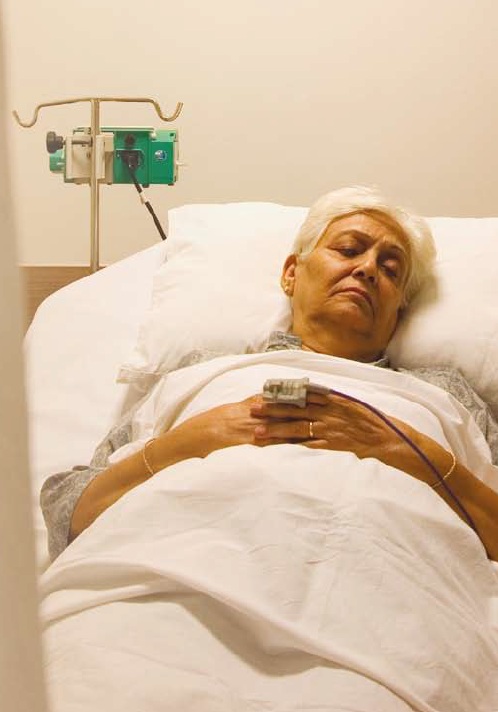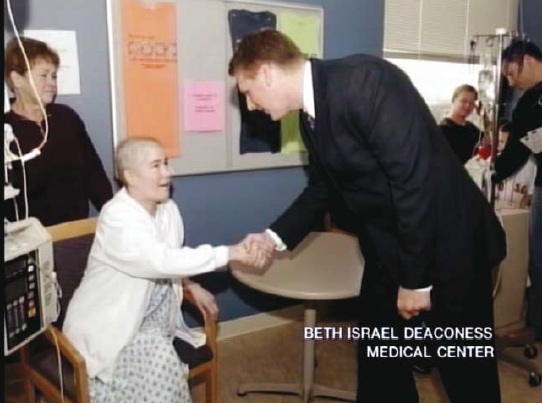Small Changes to Make a Big Difference in Patient Care - Once an ICU patient for three months (two of which were in a coma), Nancy recognises the incredibly challenging job of medical professionals committed to delivering the highest quality healthcare to the most ill patients. Through her unique perspective Nancy identifies communication strategies and multiple low-cost, high-impact techniques to achieve higher patient satisfaction.
On May 15th 2005, on a flight back home after a speaking engagement in Atlantic City, I suddenly fell ill. I was too weak to walk and I had to be taken off the airplane in a wheelchair and brought to my local ER.
The following morning, I was transported by ambulance to the Intensive Care Unit (ICU) at Beth Israel Deaconess Medical Center in Boston. I was sick—really sick. On death’s door kind of sick. But like many of your sickest patients, I didn’t know how ill I really was. Within three days of arriving to the ICU, I was told that I was undergoing complete organ failure. Although my kidney's improved, my liver would need to be replaced. I never thought I’d be the recipient of an organ donation….until then. Three days later, I was in a medically-induced coma waiting for a viable organ.

I would either wake up with someone else’s liver, or I would never wake up.
When I awoke on July 17th, I learned that I had survived a liver transplant and had died twice—the second time for more than two minutes leaving my medical team to wonder if I’d be the same cognitively if and when I woke up from the coma. They had found a blood clot in my new liver after finishing the transplant and needed to remove it in order to take the blood clot out and make sure there were none remaining. They told my family to be prepared as I might need long-term medical care, after a more than 13-hour surgery that started on a Sunday night and ended the following Monday morning.
Two weeks after the transplant, while still in a coma, I underwent emergency brain surgery for an abscess that was found during a routine CT scan. I became septic and a hole was drilled into my skull to alleviate the cranial pressure I was also trached so I couldn’t speak or move and was in an almost constant state of panic.
When you’re as critically ill as I was it takes a miracle and a lot of ‘big’ changes and saves by an esteemed medical team to get you to the other side of being healthy again. It also takes so many ‘small’ things that may seem inconsequential to the nurses, aides, interns and cleaning staff that make a huge difference in a patient’s physical, mental and emotional health—all important parts of healing.
According to my liver doctor, Dr. Michael Curry,
“Nancy was transferred into us with abnormal liver blood tests and she was quite ill when she arrived here. Within a matter of a few hours we determined that Nancy actually had liver failure—her liver wasn’t working correctly. And she had developed this unusual form of liver failure called acute liver failure; this is an illness that occurs in patients who have no prior history of liver injury. And as a consequence to exposure to a virus or some other [sic] and damaging effect to the liver, the liver actually becomes dead tissue in a matter of a few days to a few weeks. These patients are as close to dying as one can get.
At that time the only thing that was going to save Nancy was a liver transplant.
In some patients who develop acute liver failure they can also develop a problem where their brain begins to swell with fluid and they develop a condition called cerebral edema.”
As Dr. Curry stated I was as close to death as a human could be; so sick in fact, they almost elected not to do the surgery. Thankfully, Dr. Curry made a life-saving case for moving forward with the transplant given that I had no prior illness, was young and relatively healthy and the mother of three young children.

One Person can Make a Huge Difference
When a team of at least 10 physicians left my room shortly after my arrival into the ICU, and after what felt like hours, Frank, a nurse, came along who was able to make me feel more at ease. He was the first person who greeted me in the critical care unit, with a warm smile, twinkle in his eye and a salt and pepper beard. He made me feel like the most important person he’d ever met.
Frank normalised things. He would make a gesture with his two fists and put them together a couple of quick times: giving me the sign that I could do it, that I could make it through this. It was Frank’s version of a high-five and it was a small gesture that offered me great emotional and mental support—all without saying a word.
That first afternoon he commented on my manicure and pedicure and said that he’d never seen this on someone before.
He mentioned it at least three times and asked me what the white tips at the ends of my nails and toenails were called. I told him it was a French manicure. “No wonder you look so great, a French manicure” he said. I was not looking great by any means, but he told me that if I took such good care of myself, he would take care of me the same way; and I believed him. Frank took the time to connect with me as a person, and not just his patient.
A Seemingly “Small” Thing to do Was a Lifesaver for Me
One week to the day after I arrived in ICU, I received a non-compatible blood type organ from a young woman named Erica from Appalachia, Virginia. She had died in a car accident.
And was survived by her two children who were ages two years old and eight months at the time. When she was only 16 and received her license, she made the seemingly ‘small’ decision to become an organ donor. Erica and her family’s immense loss became my lifeline.
Because of that beautiful young woman, the because of the medical community—researchers to surgeons—, from the anti-rejection drugs that keep my new liver working, I’m able to offer you my perspective as a patient.
When Over-Communicating Lessens Fears
I thought that after surviving the transplant that the worst was over. The last month in the ICU left me in a constant state of fear that I would die of suffocation trying to be weaned off the respirator.
I wish that someone had explained to me that since I wasn’t breathing on my own, the machines were breathing for me, and they were gradually and deliberately being dialled down to help my lungs work harder and become stronger on their own so I could eventually get off the ventilator. Instead, I thought my medical team was trying to kill me. What I didn’t know was that I was suffering from ICU psychosis.
So, would I have understood the nuances of my respirator and what my medical team ultimate objective was going to be? I’m not sure, but my advice would be to continue to send the same simple message and know that your patient may or may not fully believe you. However, there’s a great possibility that she will begin to understand and be grateful that you stayed the course in trying to communicate something that could very well be terrifying her.
Nothing but Blue Skies…
While trached, I had been mouthing out that I wanted to go outside. I was consistently told “no”, “you’re too immune suppressed, you need to stay inside for now.”
It was August when Frank came in to see me and took me for a CT scan. We went down the all too familiar corridors, and he waited until I was finished. As I came out of radiology, he smiled and began to wheel my bed down several long halls deep in the bowels of the hospital—all unrecognisable to me at the time, which I thought was odd, until we pushed through two huge double dark doors blackening the end of another long corridor. Where were we going I wondered?
Suddenly, we were outside on the loading dock of Beth Israel Deaconess Medical Center in the shining sun and breezy fresh air on the most amazing August day.
He pushed my stretcher until my legs could feel the sun’s warmth beating down for the first time in months. It was an unforgettable moment for me. It meant so much that he would take time to do this for my sake. It is probably my most positive memory of being hospitalised (other than taking my trachea out).
Never Underestimate the Power of Providing Hope
After being transferred from the ICU to Rehabilitation and re-admitted for ‘failure to thrive’ diagnosis, I returned 11 more times over the next six months for various complications. I had two rejection episodes, high potassium levels, aspergillum in my lungs, and an inner ear imbalance causing an almost constant state of being nauseous and unable to eat.
One day, Erin my nurse practitioner was telling me when I needed to make the next appointment, and when to take another new medication that I had been prescribed. I was at an all-time low, feeling horrible several months after my transplant, and I looked at her with raw emotion and asked her, “Erin, will I ever get better?” She looked at me with an expression of almost disbelief and said, “Yes, yes, you will get better.”
I realise now, that Erin hadn’t a clue as to whether my situation would turn around or not, but she did know what to say. She gave me hope when I had none. I know there’s a fine line between lying and offering encouragement, but her words and the way she said them, gave me strength in that moment that I held onto. I remember deceiving myself into believing that “if Erin said I’d get better, then I will.”
Final Thoughts
Obviously, patients want great technical expertise (that doctors have), we want the best physician to make the diagnosis, perform the surgery, and continue to administer treatment to ourselves and/or family members. But what matters to us patients are the small things that are said and done that keep our spirits up and give us hope.
There’s an expression that “little hinges swing big doors,” and that’s so true. It doesn’t take a lot of effort to make a significant difference. I hope that my experience can help you become more effective communicators and even more compassionate and empathetic to your patients. It can help to reduce their fears, drive better outcomes, increase compliance and patient satisfaction. In the end, it may be the small things that mean the most.